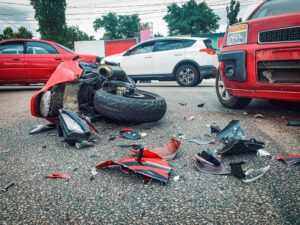
When pursuing compensation after a motorcycle accident, there are several steps that must be taken before you can recover damages. Attempting to navigate the process on your own can be challenging. Fortunately, an experienced motorcycle accident lawyer can walk you through every step and give you the best chance of getting the money you need and deserve.
At the law offices of Vaughan & Vaughan, we will handle every step of the motorcycle accident process so you can focus on your health. Our firm has been helping accident victims recover compensation for more than 100 years. Reach out to us today by phone or through our website to schedule a free consultation with one of our Indianapolis motorcycle accident attorneys.
Hiring an Attorney After a Motorcycle Accident
The first step toward recovering compensation through a motorcycle accident lawsuit is hiring an experienced personal injury lawyer to represent you. While it is possible to pursue compensation on your own, your chances of securing a favorable outcome are going to increase dramatically with the help of an experienced legal representative.
When you hire a lawyer to help you in your pursuit of compensation, they will handle every step of the process, leaving you free to focus on healing from your injuries. Your attorney will keep you up to date on all developments and advise you of the best options at every stage of your lawsuit.
Your Case Will Get
The Attention It Deserves

Determining Liability in a Motorcycle Accident
The first thing your attorney will do will be to investigate your accident to determine who is at fault. You won’t be able to file a lawsuit until you determine who you will be filing against. During this initial investigation, your attorney will also be looking to collect any evidence that helps support your claim for damages.
Evaluating Your Damages After a Motorcycle Accident
The next step will be for your lawyer to assess the compensatory damages you have suffered and calculate the full value of your claim. Identifying all the damages that apply is critical for recovering the full amount to which you are entitled.
Once your lawyer has determined how much your damages are worth, they will be able to give you a ballpark figure of how much you can expect to recover if you win your case. Your lawyer will also have a starting point for how much to ask for as they pursue compensation through the court and in negotiations.


Filing a Motorcycle Accident Lawsuit
The next step will be for your attorney to complete the required paperwork and file a lawsuit against the liable party. After submitting the documents and serving the defendant notice of the lawsuit, your attorney will begin the steps of the pretrial process.
Depositions
One of the steps in the pretrial process is recording depositions. Depositions are sworn testimony recorded outside the courtroom. This testimony can be from eyewitnesses or experts. Depositions are especially important because witness memory fades and becomes less reliable over time.
Depositions are recorded in the presence of the legal counsel for both parties, and each side will have the opportunity to ask questions of the deponent. Testimony given in a deposition can be presented as evidence at trial.
Discovery
During the discovery process, the two sides will share all the evidence they have gathered on the case. Discovery is important for ensuring a fair trial by providing both parties with all the available evidence so they can build the best case for their clients.
Mediation
Mediation is the final stage before a case goes to trial. Throughout the process of filing a lawsuit, your attorney will be in negotiation with opposing counsel attempting to come to terms on a settlement deal. If an agreement has not been reached by the time the case gets to the mediation stage, both parties will sit down with an impartial mediator.
During mediation, the mediator will attempt to guide the two parties toward a resolution. A mediator will not make a ruling on the case. Instead, they will suggest options for a path forward. If either party is unhappy with the proposed settlement at the end of mediation, the case will proceed to court.

Arguing Your Motorcycle Accident Case at Trial
If your case is not settled by the end of mediation, your attorney will represent you in court as they pursue compensation on your behalf. It is critical to understand that the majority of motorcycle accident cases never make it to court. It is typically in all parties’ best interest to settle out of court.
However, there are occasions where the two parties involved are unable to come to terms on a settlement deal. In these situations, a trial is necessitated.
Contact an Experienced Motorcycle Accident Attorney Today
If you have suffered damages in a motorcycle accident, it is essential that you contact an experienced attorney to help you recover the compensation you need and deserve. At Vaughan & Vaughan, we thoroughly understand the motorcycle accident lawsuit process in Indiana. Our team of experienced motorcycle accident lawyers is ready to help.
Contact us today by giving us a call or completing our online contact form and schedule a free consultation with a member of our legal team.




